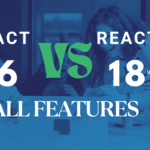Introduction
Did you know that over 40% of professional developers still prefer React over other front-end libraries? If you’re wondering why React continues to dominate web development in 2025, you’re not alone. With so many frameworks popping up, choosing the right one can feel overwhelming. So what makes React so special—and why are companies like Facebook, Netflix, and Airbnb still relying on it?
Let’s dive in and unpack why React is a top choice for developers and businesses alike.
What Is React?
React is an open-source JavaScript library developed by Facebook. It helps developers build fast, interactive user interfaces with ease. Unlike traditional full-fledged frameworks, React focuses solely on the view layer, offering more flexibility and control.
Benefits of Using React in 2025
1. Component-Based Architecture
React applications are built using small, self-contained pieces called components.
Example:
Imagine building a dashboard with user cards, graphs, and buttons. In React, each of these can be created as separate components and reused across pages.
Benefits:
- Reusability
- Easier maintenance
- Better code organization
2. Virtual DOM for Lightning Performance
React uses a Virtual DOM to update only the parts of the page that change, instead of reloading the whole DOM.
Analogy:
Think of the Virtual DOM as a smart assistant. Instead of redoing an entire document, it highlights just the sections you want to edit.
Result:
- Faster rendering
- Smoother UI transitions
- Better performance in large applications
3. Strong Community & Ecosystem
React’s ecosystem is massive—thousands of libraries, tools, and extensions are available.
In my experience, whenever I’ve hit a roadblock, there’s always a community plugin or StackOverflow thread ready to help.
Popular Tools:
- Redux (state management)
- React Router (routing)
- React Hook Form (form handling)
One Codebase for Web and Mobile
With React Native, you can use the same React knowledge to build mobile apps.
Example:
Instagram’s mobile app uses React Native under the hood for parts of its UI—proving React’s cross-platform power.
5. Backed by Facebook & Big Tech Adoption
React is maintained by Meta (Facebook), ensuring long-term support and improvements. Major companies like Netflix, Uber, Airbnb, and Shopify all rely on React.
Trust Factor:
When billion-dollar companies use it, you know it’s battle-tested.
6. Learning Curve That’s Developer-Friendly
Unlike Angular or Vue, React has a more “learn as you go” model.
You only need:
- Basic JavaScript knowledge
- Understanding of functions and arrays
- JSX (a syntax extension of JS)
Even beginners can build functional apps in a week.
7. React Hooks = Functional Programming Power
Hooks like useState and useEffect simplify state and side-effect management in functional components.
Example:
Instead of writing class-based components with lifecycle methods, you can write concise and readable code:
const [count, setCount] = useState(0);
useEffect(() => {
console.log('Component mounted');
}, []);
How to Decide If React Is Right for You
React is ideal for:
- Dynamic web apps (e.g., dashboards, social media, ecommerce)
- Teams that value modular and scalable architecture
- Projects requiring fast rendering and performance
Not ideal for:
- Simple static websites (consider using plain HTML/CSS or frameworks like Astro)
Common Mistakes Developers Make with React
❌ 1. Overusing State
Not every component needs to manage state. Overdoing it leads to messy, hard-to-maintain code.
❌ 2. Ignoring Performance Optimization
Using tools like React.memo, useCallback, and lazy loading can significantly boost performance.
❌ 3. Not Understanding the Render Cycle
Re-renders can become a performance bottleneck if not managed correctly.
FAQs About React
Is React still relevant in 2025?
Absolutely. With its continuous updates and widespread adoption, React remains one of the top libraries in web development.
Is React good for beginners?
Yes. With tons of tutorials and community support, React is very beginner-friendly.
What’s the difference between React and React Native?
React is for web; React Native is for mobile app development—but both use the same core concepts.
Should I learn next before React?
You should start with React.js because Next is built on top of React, and to become a master of Next, you need to be clear on the basics, which is React.
Conclusion
So, why React? Because it’s fast, modular, backed by a strong community, and still evolving. Whether you’re a beginner or building complex enterprise-grade apps, React offers the tools and flexibility to get the job done right.
Still unsure if React fits your next project? Drop your questions or thoughts in the comments below—I’d love to hear what you’re building!
Useful Links:











1 thought on “Why React Is Still the Best Choice for Web Development in 2025”